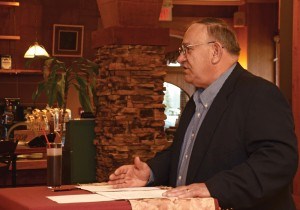
Don’t expect any adjustments to the Temporary Foreign Worker (TFW) program—that was the blunt message Jim Eglinski, MP for Yellowhead, delivered to the Jasper Park Chamber of Commerce Tuesday morning.
The candid remarks took many in the audience by surprise as local business owners continue to struggle to attract and retain employees.
“The stand of the government right now is that they are not going to change anything that they changed last summer,” said Eglinski, referring to the program’s overhaul last year, which has made it more difficult to obtain TFWs.
“A lot of businesses took advantage of getting cheap foreign workers that they could pay at a reduced rate, that they could house with eight or nine people in a single apartment, and they took advantage of it.”
During his speech Eglinski acknowledged the government’s changes have hurt some businesses, but argued the program needed to be reformed because some employers were abusing the system by hiring foreign workers instead of qualified Canadians.
He also placed some of the blame on young Canadians, describing them as “lazy” and unwilling to leave their communities to find work.
“Our younger youth have inherently become lazy or greedy to the point that they want higher paying jobs and we can’t get them to leave the major centres and go fill these positions that are needed.”
Diana Laarz, co-owner of Robinsons Foods, she said she is worried about how the new rules will impact the ability of local businesses to retain their current employees.
“This summer there is going to be a lot of poaching between businesses, it’s going to create a real problem,” she said, adding that an employee she recently hired was poached by a hotel.
In September, Laarz hired a TFW, but with the new $1,000 application fee required to obtain a TFW she said she has stopped hiring them all together.
For other businesses, such as the Fairmont Jasper Park Lodge, which employs about 700 people in the summer, the changes have only had a small impact, because TFWs only make up about 10 per cent of the hotel’s entire workforce.
“We have a very diverse recruitment strategy where we don’t rely on one area to support our staffing needs,” said Jennifer Melanson, director of human resources for the hotel.
“We have been successful in filling the void, but it’s not without effort,” she said.
Prime Minister Stephen Harper first announced the government would reform the program in April 2013, after media reports found the number of TFWs in Canada had more than doubled since 2006, reaching about 338,000 people in 2012—in the midst of one of the worst economic recessions in recent history.
Nearly a year later the program was suspended for the food services industry, after additional media reports indicated a number of high profile fast food restaurants were still abusing the system.
In the summer of 2014, the government ended the moratorium on the fast food industry and officially announced it was overhauling the entire program.
The new rules, which come into effect on April 30th, will bar employers from hiring low-wage TFWs in regions where the unemployment rate is above six per cent, require employers to cap the number of TFWs they hire to 10 per cent of their workforce, prove they need to hire a TFW over a Canadian and increase the number of spot checks in the workplace, with the threat of fines for those who break the rules.
During Eglinksi’s comments, he acknowledged his own role in lobbying the federal government to change the TFW program when he was mayor of Fort St. John, B.C.
“I was part of the original working group of mayors across Canada in 2005 to convince the federal government to change the Temporary Foreign Workers program.
“It was never meant to be lasting across Canada. I wish they didn’t and now we are suffering for it, especially here where it’s needed.”
Paul Clarke
[email protected]
